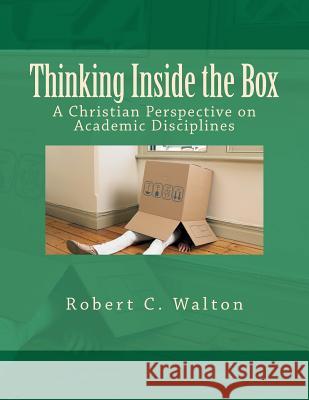Thinking Inside the Box: A Christian Perspective on Academic Disciplines » książka
Thinking Inside the Box: A Christian Perspective on Academic Disciplines
ISBN-13: 9780615539508 / Angielski / Miękka / 2011 / 198 str.
Secularism has become the religion of the university campus, and Christians are often subjected to ridicule and taught that what they have learned from their parents, (Christian) school, and church is not worthy of consideration by a thoughtful person in today's society. How are Christian young people to be intellectually and spiritually equipped for today's college campuses? Students must first understand that "all truth is God's truth." The world is not divided into the realms of the secular, where science and humanism reign and religion has no place, and the sacred, where beliefs amount to little more than unsubstantiated opinion not worth discussing in academic circles. Nothing about God's world may be rightly understood apart from His Word. Secondly, students must recognize that everyone has a worldview through which he interprets everything around him. Humanists love to picture their approach as objective and unbiased because it is based on science while dismissing Christian thought as subjective because it is grounded in faith. Nothing could be further from the truth. Everyone makes assumptions about the nature of reality, and those assumptions, whether secular or religious, are not subject to proof. Instead, they are spectacles that color everything he sees and determine how he understands all that he encounters. Thirdly, all worldviews are not created equal. Just because worldviews are not subject to proof does not mean they cannot be evaluated. In order for a worldview to be considered valid, it must be internally consistent, must correspond to the world of human experience, and must be able to be lived out in practice. Humanistic worldviews simply don't measure up. Only the Christian worldview, founded in God's Word, provides an adequate foundation for understanding the world as it is. If a worldview is like a picture frame through which one peers out at the world, a "box" inside of which a person cannot avoid thinking, Christians must "think inside the box" that God has given us. Fourthly, the Christian student must be equipped to discern the worldviews underlying the ideas that he encounters in the college classroom, especially since they are rarely stated openly. This is essential for believers to be faithful servants of Jesus Christ by "taking every thought captive" and learning to "think God's thoughts after Him." Only then will Christians be in a position to fulfill the Cultural Mandate and exercise dominion over every aspect of life to the glory of God. Finally, thinking about reality in the context of a Christian worldview has great apologetic value. While no one should expect to argue unbelievers into the Kingdom of Heaven, we must be able to give an answer when asked why we believe and act as we do. The people in the secular society have been brainwashed to believe that Christians are ignorant, bound by outmoded tradition, and incapable of dealing realistically with the modern world. A careful analysis of secular thought will demonstrate just the opposite, and students who engage in such a study will be able to stand up in the face of the inaccurate perceptions and straw-man arguments that the world so often uses against Christians. The book covers thirteen academic disciplines organized around four broad categories - Humanities, Social Sciences, Natural Sciences, and Fine Arts. Each chapter seeks to explain how and why the Christian approach to each subject differs from the secular approach, and the consequences of each. While each section includes specific examples, the main focus is on the underlying assumptions that distinguish Christian from non-Christian thought. After all, the conclusions reached by unbelievers are hard to attack if their worldview is tacitly accepted. We want our Christian young people to be like the Bereans who, after listening to the Apostle Paul, spent their time "examining the Scriptures daily to see if these things were so."











